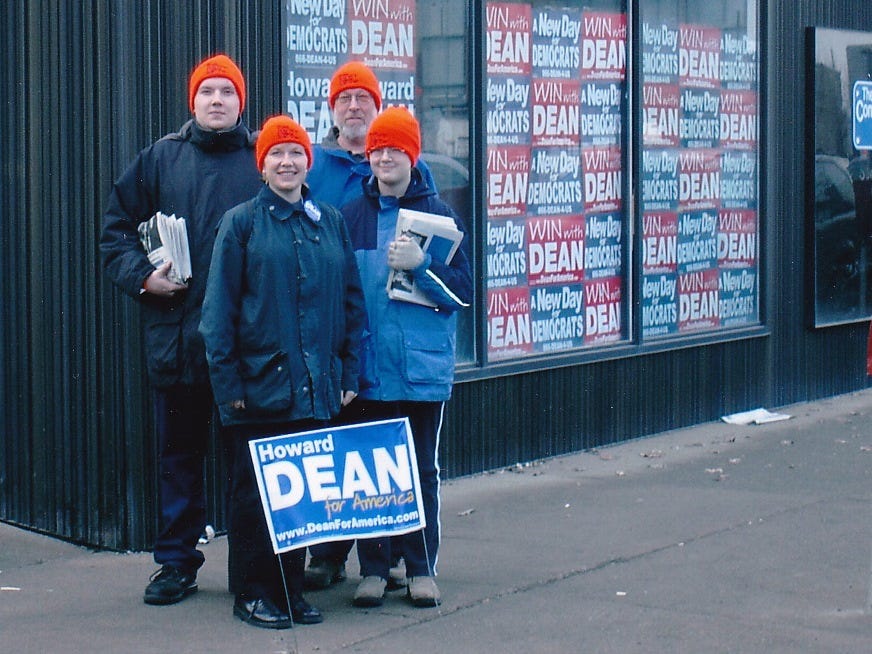Talking to Strangers
We have to start talking, and listening to people who don't agree with us.
Believers used to believe in proselytizing, or “witnessing” as the fundamentalist Christians call it (as do the Jehovah’s Witnesses, of course). Witnessing meant talking about your faith to nonbelievers, and making your faith clear from your behavior as well as, all too often, by wearing ugly t-shirts and, as my cousin Cheryl did, carrying a handbag with the word Maranatha stamped into the leather. (This supposed to be a conversation starter.)
Hare Krishnas ran restaurants to entice potential followers. Scientologists had a structured plan for persuading people to come to meetings. It was quite impressive: when I was at college, another student, lively and well-dressed, plunked herself down on a bench next to me and started making conversation. Only after 5 minutes general chat did she begin to talk about her peculiar belief system.
But the idea of working at it, of having a responsibility to persuade and convince others, seems to have vanished. Everyone wants a soapbox. No one asks questions about other viewpoints or seems interested in listening to different opinions.
My mind goes back to a conversation at the airport in Des Moines, Iowa, on a freezing day in January 2004.
The man standing in front of me was in a long winter coat. He too was probably in his forties, clean shaven, very neat. The airport was packed with people going home after canvassing in the primary election. We nodded agreement about the slowness of the line.
My family had gone to Iowa as volunteers for Howard Dean, a Democratic Party presidential candidate. We had come with high hopes and were leaving with hopes dashed.
The man and I started talking. He was, as I’d guessed, a Republican, a conservative Republican. He was well-spoken, soft-spoken, and sincere. He told me that all these changes the Democrats wanted were “a slippery slope.” The line moved, we went our separate ways, and I thought about what he meant by a slippery slope.
A slippery slope that would lead who knows where, to a future without familiar markers and boundaries, without the comforts of home and family.
Most people want things to stay pretty much the same, and what Democrats and liberals and environmentalists are always talking about is how things are going to be different, and not in ways that will make their lives better or easier.
I thought of the Gays for Dean party that we had gone to by mistake. My airport friend probably would have imagined people in wild costumes and half naked, while I didn’t notice anything special about the crowd. In fact, we were there for ten minutes before my son whispered, “Mom, I guess you didn’t read the invitation.”
We seemed to be the only family there for the Perfect Storm, as the campaign was called, so we were interviewed over breakfast and missed having Tom Brokaw follow our doorstepping only because we’d gone to visit Iowa relatives (who are now, I suspect, MAGA Republicans) and been out of cell range when his producer called.
I was stunned when I realized we weren’t going to talk to anyone but Democrats. Admittedly, in that case we were asking them to choose Dean over other candidates, so it made some sense. But once the parties’ candidates are chosen, the focus is party voters and getting them to the polls.
Doorstepping now seems to me the great mistake in US politicking. It’s also phone calls and texts now, but the principle is the same. You contact known supporters or your-party members and ask them for money or, when doorstepping, ask them to be sure to vote.
Be sure to vote. That’s the mantra. It’s the turnout that matters. It’s our voters who matter.
Persuasion seems to be for dummies. Why try to convince someone of something different? Why talk to someone who doesn’t agree?
Well, in early days, talking to people with other views was simply part of life. Going to school or church, playing baseball, stopping at the barbershop.
Say we were able to sit and talk. I could ask what the man at the airport meant by a slippery slope, and find out what he was afraid of.
Would we agree on everything? Certainly not. Would we agree on some things? Definitely. And would we change each others’ minds? Probably.
We’d experience the give-and-take of conversation and the learning that comes from listening. Maybe we’d even hear what we’re saying ourselves in a new way. Maybe our pitches would improve.
There is so much most of us have in common. But our political system and the media, as well as the loss of community gathering places that everyone goes to, push us into enemy camps.
We saw the worse of the media in Iowa. Not only had Howard Dean not triumphed in the primary, but his speech afterwards was broadcast with such noise distortion that it became known as the “Dean scream,” and the beginning of the end of his candidacy.
The four of us had picked up the newspapers the next morning in good spirits. He hadn’t done as well as we hoped, but the fight was still on and the sun was shining.
The kids’ eyes went wide as they read about The Dean Scream.
“But we were there, Mom.” The post-primary gathering was a packed ballroom. It was dark, packed with young people who were talking a mile a minute. Music was playing. Around the sides were the media, with their cameras and furrowed brows.
Howard Dean came on stage, a compact, energetic figure who knew he had a job to do, keeping our spirits up for the next round. The room became even noisier as everyone started responding to his speech with cheers and clapping.
But the newspapers made it sound like he’d been in a room alone screaming hysterically. The microphone had picked up his voice, not the roar in the room. My kids said they’d never trust a newspaper again.
But the media wants drama, and clicks - revenue, that is. So do the politicians. The people standing in that dark, noisy ballroom and under the glare of airport lighting are forgotten. It’s our country, though, and it’s the country, for better or worse, of those shouting people in red baseball caps. We need to find ways to break through to some of them. I’ll buy the beer.
PS: I am leaving in a few hours for the Massachusetts Democratic Convention in Worcester, where I am a delegate and will be voting on candidates for governor, lieutenant governor, and other offices. I’ll probably have a few more things to say about politics and persuasion after the convention, and will be posting on Twitter during the events.








I sympathise with points made. But as an Australian, I must point to the role played in this state of affairs by your First-Past-The-Post electoral system. Our preferential system (plus proportional voting for the Senate) has just yielded a winding back of Trump-channeling polarisation (in the winning of government by the Albanese Labor Party). Even the major parties have to pay minimum respect to minorities and subsectors. Not all values have to be aggregated and weaponised for wedge strategies.
I agree in principle to the idea of listening to people who don't agree with us. I've done this while canvassing door-to-door for relatively liberal candidates (specifically Democrats) in purplish red states such as Montana. Quite a few Republicans and other right-of-center Trumpaholics are willing to tell you that all Democratic "libtard" candidates suck and some even are willing to provide a reason or two to explain their thinking. I haven't found these kind of exchanges of much value or interest, though, since it seems as though most of the time I've merely heard somebody parroting what they have heard on right-wing corporate talk radio such as Limbaugh and his ilk, or else right-wing corporate broadcast media such as Tucker Carlson and his fellow propagandists at Murdoch Misinformation Media, Inc. So in practice, I think I would prefer to get a root canal at the dentist's rather than spend half a day on the receiving end of vitriolic sloganeering from Trumpaholics during a door-to-door canvassing session.
I agree that the so-called Howard Dean "scream" was actually more like a slightly loud cheer or expression of enthusiasm--and did not sound demented except when anti-leftist ideologues and corporate media personalities intentionally snipped it out of its context of a campaign speech and amplified it. Dean was on the fringes of the D.C. corporate-friendly Democratic political establishment, sort of like fellow Vermonter Bernie Sanders, and thus was frequently subject to scorn when not being ignored altogether. Unlike Trump, Dean was not puffed-up celebrity who was a lucrative candidate to cover. During that campaign, Edwards and Kerry were preferred by the Beltway party establishment. It turned out the Kerry's patrician unwillingness or inability to fight back against those thuggish Swift Boat attackers was a key factor in his loss to Bush Jr. (along with voter suppression by Ohio's state Republican machine). If Dean would have managed to overcome the scream smear campaign and become the Democratic nominee, I think he would have fought back more effectively against similar attempts at GOP character assassination than Kerry did.